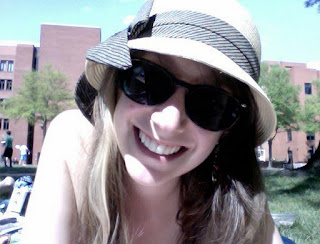Q&A with English Work-Study Student Tori Kerr
Earlier this week, I received the following email:
“Dear Employers,” it reads. “As we plan for National Student Employment Week (April 9 – 13, 2012) we’d like to hear what your office has done in the past to recognize your student employees. We’ll organize and publish what we learn.”
Who knew there was such a thing as National Student Employment Week? Turns out it’s sponsored by the National Student Employment Association, “a non-profit association of professionals involved with programs for students who work while attending college.”
What would be more fitting, we thought, than to feature our two wonderful work-study students in English this year? Every semester, the English department employs a couple of students, ideally majors, to work with office secretary Linda Terry and manager Constance Kibler. So, in looking forward to the week of April 9, we offer this profile.
****
 |
|
| English work-study student Tori Kerr |
Did you know about National Student Employment Week? How do you feel about being recognized?
I actually did not know about National Student Employment Week! I think it’s wonderful to be recognized. I think people sometimes forget that the life of a college student is not all parties and all-nighters.
What’s the best thing about working in the English department?
The best part of working in the English Department is the wonderful conversations I get to have with witty and intelligent people. There’s definitely a sense of community among the English-loving folk.
On a more serious note: How does work-study fit into your experience at GW? What are your thoughts about affording college–not necessarily GW specifically, but private colleges and universities generally? Students elsewhere (in California, for example) have been protesting student debt. Are you and your friends also concerned about student debt?
Student debt is definitely a looming shadow on my college career, as it is for most students. GW, though often called “America’s most expensive college”, has been extremely helpful financially. Work-study is great, not only because of the obvious monetary compensation, but because it allows me a few hours every week to separate myself from the stressful, competitive side of scholarship. While I may be working on a paper, I’m not surrounded by other students (as I might be in Gelman), which creates a clearer intellectual atmosphere—at least, for me.
Are there particular courses/professors/areas of literary or cultural study that you’ve particularly enjoyed at GW?
It’s quite difficult to discern specific aspects of GW academia that have impacted me—I’m a product of all my Creative Writing and English Literature professors. What I can specify is the impact of a Women’s Studies course I took last year, with Bonnie Morris. I was, admittedly, one who scoffed at the idea of “women’s studies”, but that was only because I was so ignorant of the subject. It was an eye-opening experience not just as a woman but as a scholar and writer. The feminist lens is hardly a narrow, radical, bra-burning perspective of the world, but one that is crucial to understanding society then and now. I recommend women’s studies to everyone and anyone—especially boys.

